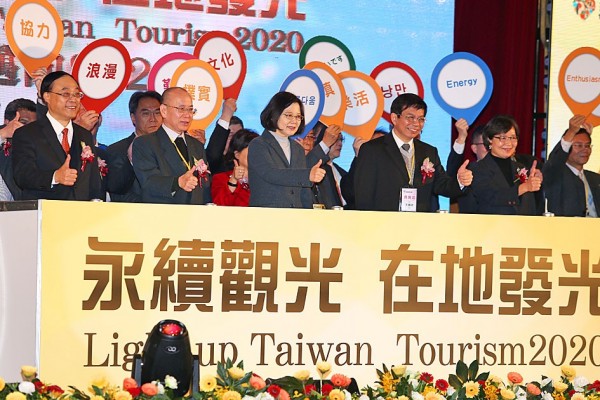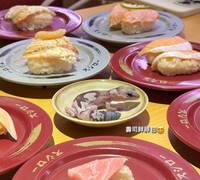《TAIPEI TIMES 焦點》 Tsai vows to boost tourism industry

Front row, from left, Tourism Bureau Director-General Chou Yung-hui, Minister Without Portfolio Chang Ching-sen, President Tsai Ing-wen and Taiwan Visitors’ Association head Yeh Chu-lan gesture on the podium at the Tourism Festival at the Grand Hotel in Taipei yesterday. Photo: CNA
STRATEGIES: Taiwan is in the center of the Asia-Pacific region and has a diverse culture, cuisine and landscape, which are key tourism resources, the president said
By Shelley Shan / Staff reporter
President Tsai Ing-wen (蔡英文) yesterday vowed to use all available resources to develop the nation’s tourism industry and make it an important travel destination in Asia.
Tsai made the remarks at the Tourism Festival award ceremony at the Grand Hotel in Taipei.
The nation last year welcomed 10.69 million international visitors, Tsai said, adding that the tourism sector would be the economy’s main driver and enables Taiwan to communicate with the rest of the world.
“I am here today to show that the administration cares about the tourism industry,” Tsai said.
“We will support our tour operators so that the quality of tourism services in the nation can continue improving and attract more international travelers who would return multiple times,” she said.
Tsai said that the tourism industry is at a turning point and would face many challenges this year.
However, she said that the government aims to use all available resources to promote Taiwan as a tourist destination and is to establish workstations in the nation’s northern, central, southern and eastern regions to integrate and distribute resources.
While each county would have its own tourist attractions, the central and local governments must work together to incorporate them and jointly promote them, she said.
Tsai promised that the government’s policies would be more aligned with the demands of the tourism industry.
The Tourism Bureau has laid out strategies to diversify the sources of international visitors, promote domestic tourism, transform the tourism industry and develop “smart” tours, she said.
None of these policies can work without input and suggestions from leaders in the tourism industry, Tsai added.
“We must create opportunities for all sorts of developments in the tourism sector,” Tsai said. “Taiwan is in the center of the Asia-Pacific region and has a diverse culture, cuisine and natural landscape. All these are important tourism resources. I look forward to seeing more innovative tour services so that the sector can continue to grow.”
Tsai touted the success of her “new southbound policy,” which she said has dramatically increased visitors to Taiwan from Southeast Asian nations.
For example, the number of tourists from Thailand last year increased 90 percent from 2015 after the government waived the visa requirement for travelers from that nation, Tsai said.
As more people choose to travel independently rather than joining tour groups, the tourism sector should improve the quality of services and infrastructure, making it more convenient and friendly to international travelers, she added.
The nation last year lost about 670,000 Chinese tourists due to the cooling of cross-strait relations, but Taiwan still attracted 3.5 million visitors from China, Minister Without Portfolio Chang Ching-sen (張景森) said.
Chang said that the nation has had “tremendous success” in other markets, including Japan, South Korea, Thailand and Brunei.
The number of Chinese tourists is expected to keep declining this year and affect more tour operators, Chang said.
The government will strive to stabilize the Chinese market and improve the quality of tours for both independent Chinese travelers and those who come in tour groups, he said.
Chang said that apart from adding more nations to the visa waiver program and streamlining visa application procedures for tourists from certain nations, Taiwan’s representative offices around the world would be subject to evaluations with regard to their performance in promoting tours to Taiwan.
“We hope that more tour operators will devote resources to explore business opportunities in Southeast Asian nations, particularly for Muslim visitors,” Chang said.
The government is also committed to expanding the domestic tourism market, which generated 180 million visitors last year, he said, adding that the Cabinet hopes to raise the number to 200 million in the next few years.
新聞來源:TAIPEI TIMES



















